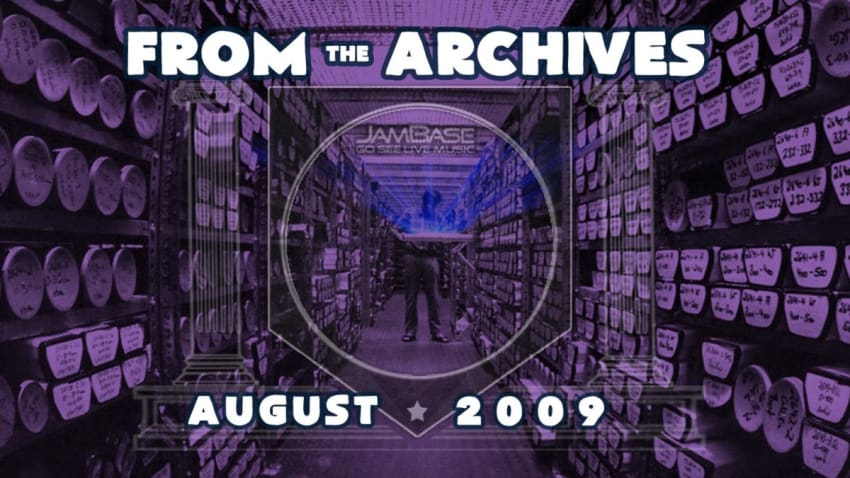Yes/Asia | 07.29 | New Jersey
By Team JamBase Aug 10, 2009 • 3:54 pm PDT

Yes/Asia :: 07.29.09 :: Wellmont Theatre :: Montclair, NJ
 |
In an effort to break out of the traditional verse-chorus structure found in most popular music of the 1960s, bands of the progressive rock movement sought to combine elements of not just rock but classical, jazz and pretty much anything else they could get their hands on and bundle up into genre-defying, tight-knit compositions. What resulted was some of rock’s most brilliantly conceived pieces. As prog-rock itself progressed over the next few decades, most of the bands from its heyday of the late ’60s and ’70s slowly died out. But one band proved to have the longevity to make it into the 21st century, carrying on the legacy of those glory days.
Yes has aged gracefully. With three fifths of the band now in their sixties, the current manifestation of the band is still capable of reproducing Yes’ immensely complicated work to a T as they demonstrated inside Montclair’s elegant Wellmont Theatre. Admittedly, I was a bit skeptical when Steve Howe (guitar, vocals) first took the stage with the opening band Asia and meekly strapped on his guitar. His long balding silver hair capped off a frail, expressionless face in an eerie manner reminiscent of the Crypt Keeper. But from the drop of the first note one thing was clear – this guy could still play.
Asia is a prog-rock super group of sorts. In addition to Howe, the band is comprised of King Crimson alumni John Wetton (bass, vocals), Carl Palmer (drums), the P in ELP, and Geoff Downes, who had a brief stint with Yes in Rick Wakeman’s absence. And like most super groups in rock history, much of Asia’s material seems a bit crudely and forcefully put together. Hackneyed chord progressions and a cheesy pop-synth like the one found in Van Halen‘s “Jump” or so many Journey songs festooned most of the originals they played, such as “An Extraordinary Life” off their latest release, Phoenix. It was that typical 80s-era prog sound from when a plethora of new technologies were available to musicians but before they quite figured out how to use them tastefully. Downes matched the ’80s sound with a stereotypical glam-rock outfit with platinum blonde hair and all-too tight leather pants.
 |
Triumphant music poured from the loud speakers as Yes took the stage, prompting a standing ovation from the mostly middle-aged crowd. Wearing the same indifferent expression on his face, Howe immediately outdid himself, running through highly intricate melodies flawlessly. It’s no wonder Yes’ music has been dubbed “progressive.” Tightly composed sections were fluidly strung together in a manner that felt like the music was indeed progressing towards some ineffable objective. Each part of a Yes composition is capable of being its own sovereign entity, yet when placed within the context of a greater scheme each section takes on a whole new significance it wouldn’t possess otherwise.
 |
Chris Squire (bass, vocals) took time between songs to introduce the two newest members of the band – David and Oliver Wakeman (keyboards). Wakeman’s swift moving fingers did his father Rick Wakeman‘s keyboard prowess justice, joining up with Howe to occasionally blaze through classical arpeggios in tandem. Only the gray hair and wrinkly skin gave away the age of Yes’ three eldest members, as these three hadn’t lost a step over the years.
“Ever since we’ve lost James Brown, Steve has inherited the title of hardest working man in show business,” quipped Squire to introduce Howe’s acoustic solo exhibition. Alone in the spotlight, Howe picked away “The Clap,” a folksy, blues-flecked tune written in celebration of the birth of Howe’s son.
A menacing swell gave way to crisp harmonics, and one of Howe’s most signature works on guitar, “Roundabout,” was upon us. “In and around the lake/ mountains come out of the sky and they stand there,” shouted a crowd full of baby-boomers, all on their feet, in unison with David. “Heart of the Sunrise,” one of the band’s most impressive compositions, closed the set. A berserk display of odd rhythms gave way to a murky bass line from Squire before exploding once more.
Evidently, Yes had saved the best for last, encoring with “Starship Trooper.” This is a song that sounds like it was written specifically to close off a concert in as epic a way as possible. Originally three separate songs written by three different members of the band, “Starship Trooper” miraculously combined to form one cohesive piece. “Würm,” the final section, penned by Howe, was a drudging crescendo over brusque trills that erupted gloriously into Wakeman’s most remarkable solo of the evening, only to be outdone by Howe who took the song to a whole other sublime level.
“Yes, oh god, Yes,” a cry of pleasure that, after this show, has taken on a whole new meaning. The glory days of prog-rock may be well behind us, but as long as these guys are still performing at such a high level we will never quite have to let go.
For more on Yes and Asia check our exclusive double-feature here.
Yes tour dates available here.
JamBase | Topographic Oceans
Go See Live Music!
